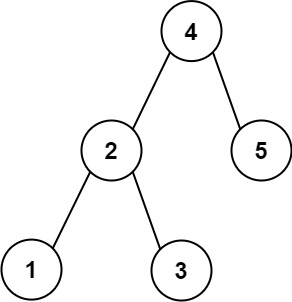270. Closest Binary Search Tree Value
270. Closest Binary Search Tree Value
Description
Given the root of a binary search tree and a target value, return the value in the BST that is closest to the target. If there are multiple answers, print the smallest.
Example 1:
1 | Input: root = [4,2,5,1,3], target = 3.714286 |
Example 2:
1 | Input: root = [1], target = 4.428571 |
Constraints:
- The number of nodes in the tree is in the range
[1, 10^4]. 0 <= Node.val <= 10^9-10^9 <= target <= 10^9
Hints/Notes
- 2024/02/15
- bst
- premium
Solution
Language: C++
1 | /** |